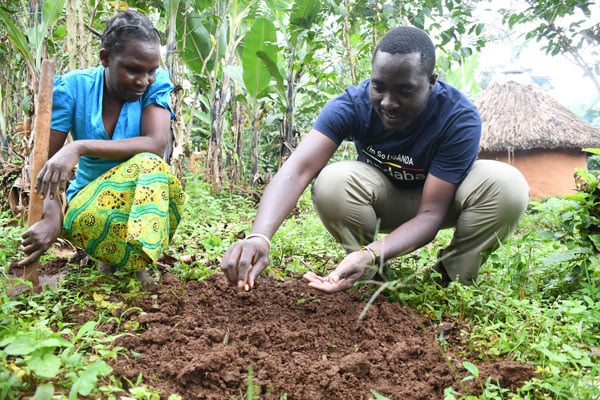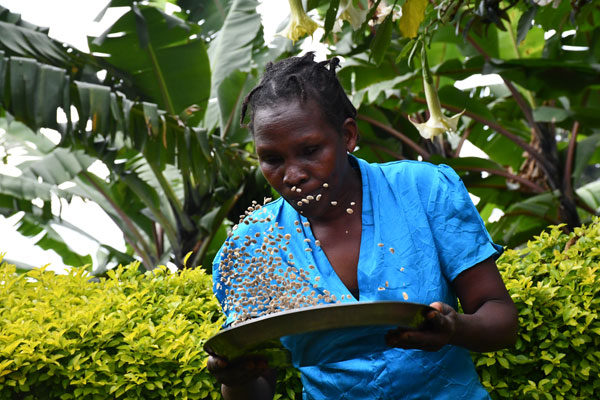This is a perfect time to boost community based tourism

A farmer shows a tourist how to plant beans during a homestay. Getting to live other people’s lives is one of the appealing things about community based tourism. PHOTOS/EDGAR R. BATTE
What you need to know:
The Covid-19 lockdown exposed the dangers of the tourism sector depending heavily on foreign tourists. One of the ways to mitigate this challenge is through proting local tourism by availing attractive community based tourism packages.
Challenges
Some people in the communities still have a negative attitude towards tourists visiting their area for fear of cultural erosion, because they are not aware of the tourist’s purpose. In some places, there are inadequate tourist facilities or infrastructure which hinders accessibility ,” says Juma Chebet, director of Codia Africa Safaris.
He recommends community sensitisation and incentivization to overcome the resistance and set people on their way to bettering their livelihoods through tourism.
According to TripAdvisor, a world’s leading global online travel advisory platform, hundreds of tourists highly recommend Buhoma Community Rest Camp for its cleanliness and quality service. The community owned Buhoma Community Rest Camp and Bandas was set up in 1993. It is located at the edge of Bwindi impenetrable National Park, in northern Bwindi.

A woman shows how to winnow cereals as a step in the food preparation process.
Training stakeholders
Ucota’s executive director, Hellen Lubowa says the association has undertaken efforts totrain some of the community based entities.
“We equip managers of community based tourism enterprises with knowledge and skills to create packages that will
appeal to tourists and how this will in time increase their income. This training also encourages them to beautify the environment as well as nurture and conserve the cultural heritage of the rural,” Lubowa explains.
The Buhoma Community Rest Camp enjoys four-star rating on TripAdvisor, a world’s leading global online travel advisory platform. The rating is based on 174 reviews that evaluate service, value, cleanliness and location.
In their review, Tgrafton from United Kingdom says the community based camp is a good place to stay. They urge other travellers to support the community project and promise them a great trekking experience in the Buhoma area. “The restaurant has a beautiful view and offers free tea and coffee. The food is simple but filling. The service was sometimes a bit indifferent, but on the whole our experience here was good,” reads their review, in part.
Stakeholders union
Hellen Lubowa, the Executive Director of Uganda Community Tourism Association (UCOTA), defines community based tourism as a platform where the local community generates economic benefits through offering their products to tourists that range from the local communities lifestyles, natural resources, and cultures.
Ucota was formed in July 1998 to promote community-based tourism in Uganda. This form of tourism requires a great participation and support from local communities.
According to tourism enthusiast Godfrey Lule, community tourism underscores the fact that communities are the key stakeholders and stewards of all the natural resources.
“Hence, community tourism is that form of tourism that is for the people. It is tourism that is pro-people. Its major aim is to enhance local benefits and relevancy. In Uganda, community based tourism enterprises are owned by communities on the peripheries of the gazetted national parks,” Lule explains.
Who benefits?
Juma Chebet, a tour guide in Sipi, says at a basic level, community-based tourism gives individuals or communities an opportunity to set up their own small-scale self-managed business and earn directly from other people willing to pay to experience the community’s lifestyle and culture. This is what is called a homestay.
Some homestay packages include tourist participation in the community’s day-to-day lives. During the stay, host family will interact with visitors and educate them about their social norms and beliefs.
They will, for instance, be instructed in how to cook the traditional food, wear traditional costumes, and even do farming with the host family. On the other hand, local communities are encouraged to contribute their knowledge besides sharing their cultures and traditions to the visitors.
“They invite them to their homestay’s to blend in and understand the culture, behaviour and the environment. They then demonstrate some community activities, such as coffee tour, preparation of the local foods, local beers etc. At the end, it supports the community economically, socially and environmentally,” he submits.
Chebet, who is also a director of Codia Africa Safaris, a local tourism company, says community based tourism is a platform that can foster development within communities since tourists pay for their stay, tours and meals while on excursions.
Like Buhoma, Kara- Tunga in Karamoja, found in north-eastern Uganda, runs community based initiatives. It employs guides from communities as well as activities to promote the Karamoja region and the culture of the people. It gives 75 per cent of the fee directly to the host communities, guides and local businesses. Kara- Tunga’s proprietor, Theo Vos observes that tourism and other sectors that benefit from it such as transport and entertainment have been negatively impacted.
“The host communities used to benefit from the additional income through community tourism and freedom of movement for local business. We have learnt a lesson about the vulnerability of tourism towards external factors,” he explains.
Clearly, community based tourism presents a support chain that feeds into lodge business, tours and travel business and the host communities that offer homestays and then the complementary activities and people involved therein.
Available packages
In Buhoma, for example, community members who own the camp, take tourists on walking safaris where they are able to experience and see first-hand women picking tea, those tending to their matooke gardens, local beer brewers, the Batwa community lifestyles and culture.
In Sipi, Chebet not only takes tours on sight-seeing expeditions of the scenic Sipi Falls, he also interests tourists in coffee tours where they are able to appreciate the process coffee goes through right from the berry to planting, nurturing, harvesting, grinding and all the way to the espresso or instant coffee serving in the cup.
On such tours, he liaises with locals within communities to tell the coffee story. Tourists are encouraged to buy coffee from them as a way of supporting the community based initiative.
In Karamoja, Vos has attached a number of community activities to Kara- Tunga tours, including cycling, mountain climbing, a visit to the Ik people and more.
These activities promote interaction with communities and the tourism offerings and attractions they have. In effect, tourists are able to appreciate much more than an attraction; the soul of communities.
Sector ripe for the picking
As it is in many communities, Dennis Rubalema, director of Ride 4 A Woman, found in the Buhoma section of Bwindi Impenetrable Forest and National Park, observes that community based tourism is a low hanging fruit that needs to be improved, supported and marketed in order to draw in both local and foreign tourists.
“More effort needs to be put in as it lacks professionalism and quality in regards to what is being produced. Investment in training and availability of grants and small loans can make a huge difference,” he argues.
Chebet also observes that community based tourism is developing at a low pace due to either communities having little information about tourism, or lack of capacity building at all on what kind of services or products they can offer in order to benefits from tourists.
He cites gaps such as the lack of capacity building among the service providers especially in light of hospitality and skills in visitor handling and responding to the needs and wants of tourists.
Sensitise the communities
“Some community people still have a negative attitude towards tourists visiting their area for fear of cultural erosion, because they are not aware of the tourist’s purpose. In some places, there are inadequate tourist facilities or infrastructure which hinders accessibility. For instance some roads tend to be swept away by floods during the rainy seasons, thereby cutting off accessibility. Accommodation is still a challenge too as some of our community homes leave much to be desired,” Chebet observes.
Lule notes that there are various facilities that need to be developed in order to support community tourism such as health centres, working roads and habitable homesteads that will create a good image to the destination and, thus encourage visitors.
“Community tourism in Uganda has been given more of lip service. As much as it accrues benefits to the local communities, less is done to incentivise the communities. We have little or no information in the case of what we have to offer to the segments both locally and internationally. Communities have not been given adequate training on how to package and market themselves properly,” he says.
The tourism enthusiast says much needs to be done in terms of developing and packaging the products of community tourism; the foods, the culture, the folk songs, the homestead and the animals.
As such, every meaningful experience needs to be appreciated and packaged for others to appreciate too. For now, he observes the gaps in community tourism stemming from the inadequacies in information. If provided, Lule is confident that the rewards would be enormous.
Ucota’s executive director Hellen Lubowa says the association has undertaken efforts to offer a solution by training some of the community based entities.
“We equip managers of community based tourism enterprises with knowledge and skills to create packages that will appeal to tourists and how this will in time increase their income. This training also encourages them to beautify the environment as well as nurture and conserve the cultural heritage of the rural,” Lubowa explains.
Challenges
The association is, however, frustrated by most communities refusing to adapt to the strategies offered.
“We continue to see a syndrome of begging. Our local communities feel they cannot make it on their own yet if they put in effort, they can excel. Some have run for long but still struggle with basic things such as offering quality customer care,” she observes.
Within the region, Lubowa says Tanzania has excelled in its community and cultural tourism thanks to the support it receives from government. As such, the products are promoted within the country’s marketing material.
She observes that Uganda has a more diversified culture but needs support and direction.
“Tanzania does not have as much as we have but they enjoy the support of the government and tourism fraternity. I envy their system in terms of marketing. All tour operators incorporate community based tourism in their products which we do not necessary do. We have not yet appreciated community and cultural products. Tanzania considers the small cultural and community entities and promotes them,” she argues.
Save for the pandemic, Lule is doubtful that a number of tour operators would put a community tourism experience on their packages, highlighting the strong following towards primate and wildlife products that draw in more foreign tourists.
He implores sector players to give community based tourism attention. “It offers enormous opportunities and benefits ranging from employment, entrepreneurship skills and art appreciation both visuals and performances, enhances conservation, research, options for other products beyond wildlife,” he adds.
Rubalema adds that until the onset of Covid-19, many tourism efforts largely targeted foreign tourists and it is time to also consider attracting domestic tourists.
“The locals appreciate quality and they will pay for what is good. We have an opportunity in this market so that when the foreigners come they complement what is already running,” he adds.
Rubalema, Lule and Chebet hinge their argument on the benefits community tourism gives, including community members making and producing crafts for sale to the tourist, foods, dances, clothes, herbs, experimental arts which can contribute to their wellbeing.





